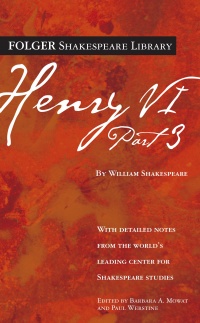Henry VI, Part 3: Difference between revisions
mNo edit summary |
SophieByvik (talk | contribs) (Added image from Folger server) |
||
| Line 7: | Line 7: | ||
Scholars believe that Shakespeare wrote ''Henry VI, Part 3'', in 1590-91; a version was first published in 1595. Sources include Edward Hall's ''Union of the Two Noble and Illustre Families of Lancaster and York'', Raphael Holinshed's ''Chronicles'', and other historical works.<ref>Adapted from the Folger Library Shakespeare edition, edited by Barbara A. Mowat and Paul Werstine. © 2009 Folger Shakespeare Library.</ref> | Scholars believe that Shakespeare wrote ''Henry VI, Part 3'', in 1590-91; a version was first published in 1595. Sources include Edward Hall's ''Union of the Two Noble and Illustre Families of Lancaster and York'', Raphael Holinshed's ''Chronicles'', and other historical works.<ref>Adapted from the Folger Library Shakespeare edition, edited by Barbara A. Mowat and Paul Werstine. © 2009 Folger Shakespeare Library.</ref> | ||
[[File:Henry VI Part 3 Folger Edition.JPG|200px|left]] | |||
== Productions at the Folger == | == Productions at the Folger == | ||
Revision as of 14:53, 27 June 2014
Henry VI, Part 3, one of William Shakespeare's plays, is dominated by a struggle between two military forces, neither of which can achieve victory for long. Until the end, the Yorkists and Lancastrians strive for the English crown. The conflict between these two families began under Richard II. Half a century later, during the reign of Henry VI, it moved toward civil war. Now, in Henry VI, Part 3, Henry’s long reign becomes intermittent as his cousin Richard, Duke of York, seeks the crown and York’s son Edward sporadically succeeds in seizing it.
As we watch the crown pass back and forth between Henry VI and Edward IV, our attention is caught by other characters: the Earl of Warwick, Queen Margaret, and Richard, Duke of Gloucester. Warwick is the power behind the challenge to Henry VI, until he shifts to Henry. Margaret raises an army in England and later leads one from France, all in a futile attempt to secure the throne for her son, Prince Edward. Historically, his death destroyed her, but Shakespeare wisely saves Margaret to bring her back in Richard III. Richard, Duke of Gloucester, increasingly draws our attention. Both attractive and repellent, he is energetic, self-aware, bitter about his deformity (which may not have existed historically), ruthless, and unable to care about others.
As this play ends, it is hard to imagine a time when hostilities cease. That resolution lies in the future, with Shakespeare's play Richard III.
Scholars believe that Shakespeare wrote Henry VI, Part 3, in 1590-91; a version was first published in 1595. Sources include Edward Hall's Union of the Two Noble and Illustre Families of Lancaster and York, Raphael Holinshed's Chronicles, and other historical works.[1]
Productions at the Folger
Early editions
First Folio
- LUNA: First Folio: o4r - q4v
- Hamnet: STC 22273 Fo. 1 no. 68
Second Folio
- LUNA: Second Folio: p6r - r6v
- Hamnet: STC 22274 Fo. 2 no. 07
Third Quarto
- LUNA: Third Quarto
- Hamnet: STC 26101 Copy 3
Modern editions
Henry VI, Part 3 can be read online with Folger Digital Texts and purchased from Simon and Schuster.
- Hamnet link to Folger Edition: PR2753 .M6 2003 copy 2 v.14
In popular culture
Translations
Performance materials
Other media
Notes
<references>
- ↑ Adapted from the Folger Library Shakespeare edition, edited by Barbara A. Mowat and Paul Werstine. © 2009 Folger Shakespeare Library.
